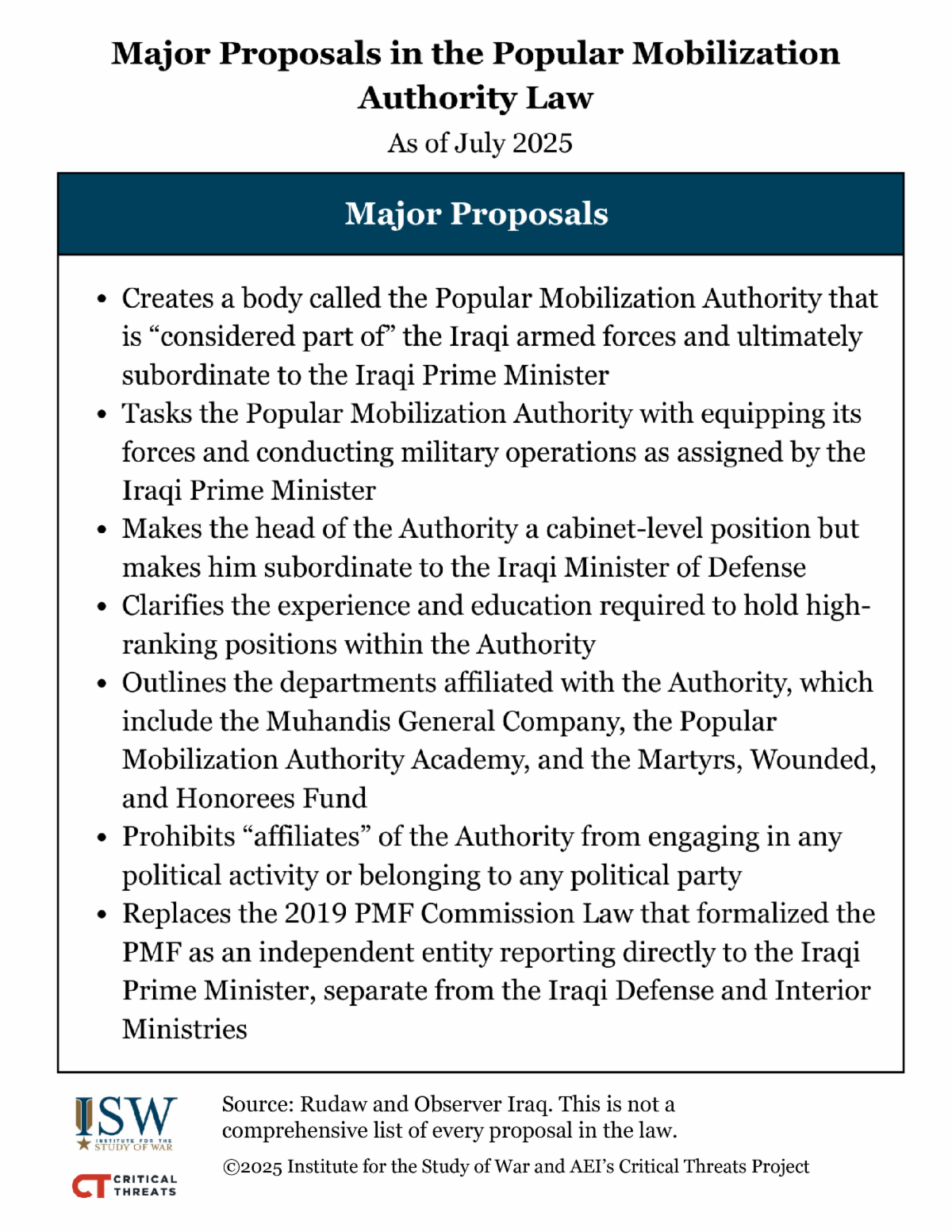The Shia Coordination Framework is reportedly divided over US efforts to dissolve the Iranian-backed Popular Mobilization Forces (PMF). The Shia Coordination Framework is a loose coalition of Shia political parties, some of which Iran backs. A source close to the Shia Coordination Framework told Iraqi media on August 19 that Shia Coordination Framework members are divided into two “camps,” with the first in support of challenging US objections to the PMF and the latter concerned about the threat of US sanctions and strikes targeting Iraq. The United States has repeatedly pressured the Iraqi federal government to dissolve the PMF and reportedly threatened to sanction PMF leaders. The PMF is an Iraqi state security service that includes many Iranian-backed Iraqi militias. This report of Shia Coordination Framework divisions comes amid a broader debate within Iraq about limiting the transfer of arms to the Iraqi state and efforts by Iranian-backed Iraqi political actors to pass the Popular Mobilization Authority Law. CTP-ISW assessed on August 6 that this law, which the Iraqi Parliament has yet to vote on, would likely increase Iran’s influence in the Iraqi political and security spheres by formalizing key PMF structures, like the al Muhandis General Company, as part of the Iraqi government. This company is controlled by Iranian-backed factions and acquired land along the Iraq-Saudi Arabia border that Iraqi groups used to launch drones targeting Saudi Arabia. The law nominally subordinates the PMF to the defense minister via the head of the future Popular Mobilization Authority, but the PMF has officially answered to the prime minister since 2016 without answering to the prime minister in reality. The US State Department spokesperson confirmed on August 12 that the United States opposes the law.
Hardline media and officials are negatively responding to recent reformist calls for change within the Iranian regime, which highlights how the post-war environment has deepened existing fissures between reformists and hardliners over how to govern Iran and engage the West. Iranian Supreme Leader Ali Khamenei’s official website said in an August 18 article that recent remarks by reformists were similar to a “quiet multimedia influence campaign” conducted by the United States and Israel, and alleged that the reformists seek to promote division within Iran over issues such as nuclear policy and uranium enrichment specifically. The article indicates that the Supreme Leader continues to reject any zero uranium enrichment demands. This statement from the Supreme Leader’s office comes after reformists have called for political reform and foreign policy shifts. The Reformist Front published a statement on August 18 outlining eleven demands, including lifting restrictions on reformist leaders, allowing free elections, reforming women’s rights laws, lifting censorship, and suspending uranium enrichment in exchange for sanctions relief. Former President Hassan Rouhani advocated on August 13 for reducing tensions with the West and expanding relations with European and neighboring countries. Islamic Revolutionary Guards Corps (IRGC)-affiliated Tasnim News Agency claimed on August 19 that reformists are conceding to Western pressure, and Tasnim warned that “trusting the enemy“ could threaten regime stability. Another IRGC-affiliated outlet dismissed the Reformist Front’s statement as a “blueprint” for selling Iran’s independence and accused reformists of spreading American and Israeli propaganda. Assembly of Experts Secretary Abbas Kaabi similarly said that the statement repeated “the enemy’s narrative” and focused too narrowly on internal problems rather than external threats.
The Lebanese government and the World Bank will reportedly sign a 250 million USD loan agreement early next week that seeks to support Lebanon’s reconstruction. This loan agreement is likely part of the Lebanese government’s efforts to use reconstruction fronts to decrease support for Hezbollah. Lebanese Finance Minister Yassin Jaber announced on August 13 that the Lebanese cabinet authorized him to sign the agreement, which the World Bank previously approved in June 2025. The loan agreement is dedicated to rebuilding infrastructure and clearing the remaining rubble in Lebanon from Israeli operations since September 2024. Lebanon has reportedly received an initial installment of 75 million euros from France and 20 million USD from Iraq, which the Lebanese Finance Ministry has started to allocate to reconstruction efforts in Beirut’s southern suburbs and southern Lebanon, which were heavily damaged during the Israeli campaign in Lebanon. The 250 million USD loan will serve as the initial funding for a 1 billion USD financing program that aims to launch reconstruction and recovery efforts in Lebanon. International organizations and entities will reportedly provide the remaining 750 million dollars in grants. The Lebanese Parliament will vote on the loan in early September 2025. | 




 [ISW] 러시아 공세 캠페인 평가, 2025년 8월 19일
[ISW] 러시아 공세 캠페인 평가, 2025년 8월 19일
 [국방부] 군공항 주변 건축 높이 제한 완화…도시정비 활성화 기대
[국방부] 군공항 주변 건축 높이 제한 완화…도시정비 활성화 기대